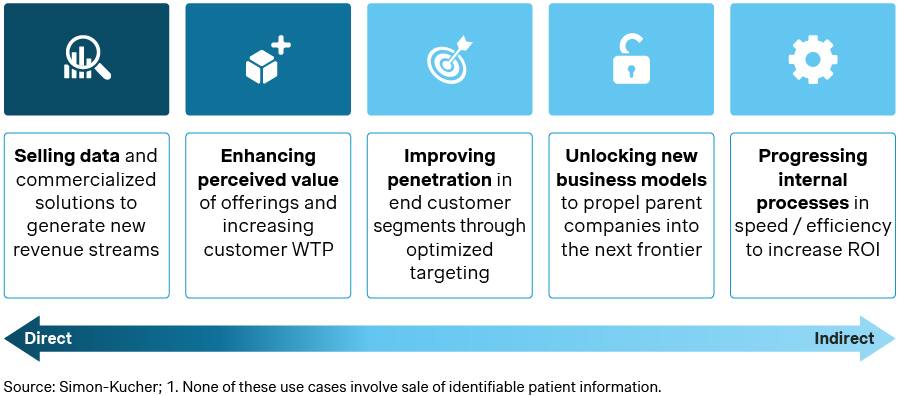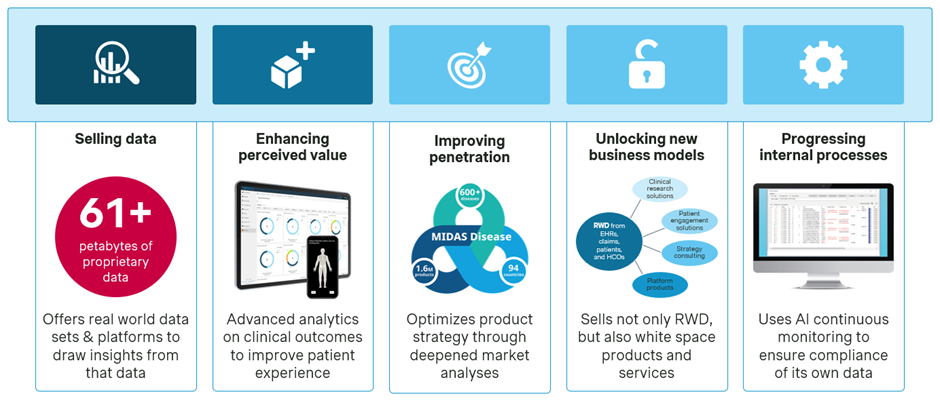By incorporating data into their growth strategy, companies in the medtech and diagnostics sector can gain a powerful advantage that allows them to surpass market expectations. With data monetization strategies, forward-thinking organizations are not just improving decision-making but also tapping into multiple revenue streams.
Despite an upside opportunity available to all companies in the sector, less than 1 percent successfully monetize their data today. Several factors contribute to this gap:
- Limited focus: Fewer than 5 percent of medtech and diagnostics companies prioritize data monetization.
- Data immaturity: Crude data, like crude oil, requires refinement to unlock its full value.
- Lack of product appeal: Not all data products are created equal – product / market / price fit must be built in.
- Narrow view of growth potential: Directly monetizing data is the tip of the iceberg -a range of growth strategies must be considered.
- Regulatory complexities: The healthcare industry's stringent regulations introduce risks and ethical bounds.
High-performing organizations have recognized the potential of with data accounting for 10 percent more of their overall revenues compared to their low-performing peers. The global data and analytics market is anticipated to be 50 percent larger than the medtech and diagnostics market by 2032 —driven by data and analytics growing at >3x the rate of medtech and diagnostics.
Examples in the healthcare vertical, as well as analogs in other industries highlight opportunities to unlock growth with data-driven strategies.
5 strategies to drive growth with data

Selling data to generate new revenue streams
When it comes to selling data, there is a progressive arch of sophistication that starts with data, leads to insight, then action, and finally culminates in the creation of value. This data value-creation process includes:
- Raw data that is unique and proprietary
- Insights that help users identify opportunity
- Actions that are customized to suit the user
Healthcare IQ, a US-based healthcare data analytics company, began with the purpose of gathering, cleaning, and standardizing billing data from various hospital systems. In 2011, they rolled out Colours IQ, a proprietary tool delivering data visualizations of spend levels to help users evaluate potential savings opportunities. To further help hospitals access, interpret, and act on savings opportunities, the company introduced a new offering of on-site consulting services in 2014.
Enhancing value of existing products
Providing product-complementary, data-driven digital solutions can enhance the value perception of existing products. By utilizing advanced data analytics and IoT technology, companies can deliver solutions that are innovative, efficient, and tailored to the needs of their customers.
NVIDIA has embedded data-driven tools to improve the performance of its chips, software, and service businesses for years. NVIDIA Clara platform uses data and processing to support early detection, diagnosis, and treatment of diseases. Clara also enhances the efficiency and effectiveness of existing hardware, allowing >10-year-old legacy medical instruments to run modern applications.
TK Elevators, a global industrial machinery manufacturer, provides data solutions across its products: elevators, escalators, moving walks, and service contracts. MAX, an IoT solution, incorporates remote monitoring and instantaneous service cell activation to dispatch their technicians preventatively, reducing elevator downtime.
The company also uses an intelligent dispatching software, AGILE, to gauge traffic demand and group passengers. This helps increase elevator speed, tenant satisfaction, and building capacity.
Better segment and target customers
Data can be used to segment customers and tailor sales targeting, improving market penetration across business relationships, including B2B. Demand Accelerator, PepsiCo's data-focused business unit, contributes billions of dollars to the company's overall revenue.
This unit combines sales data from retailers, specifically the total number of cups sold, with additional PepsiCo data on the breakdown of syrups, which is not available to end customers. It then identifies and segments out specific shopper attributes influencing purchasing behavior.
Predictive analysis assists retailers in effectively targeting their product mix. They use insights from Demand Accelerator to update the beverage offerings and better cater to their specific customer base. This leads to increased sales and consequently more syrup purchases with PepsiCo.
Unlocking new business models to propel parent companies into the next frontier
Organizations can discover new opportunities and progress into uncharted territory by establishing a reputable image as a leading data provider.
Bloomberg is synonymous with financial data. However, today it is just one element of a diverse product portfolio including financial data, analytics, professional services, news, and media. These adjacent business opportunities were unlocked by credibility created by a robust data business.
Accelerate the pace of innovation
A data-centric mindset drives efficiency across the business. Microsoft was a pioneering in building a suite of comprehensive analytical tools powered by data to enhance internal processes.
One leading example is faster assessment of sales team performance based on financial data. Close monitoring supported a 30 percent increase in sales efficiency within 15 months.
A similar strategy is increasingly leveraged by leading MedTech, Diagnostics, and Pharma sales organizations that frequently re-optimize call plans, territories, and promotions based on month-to-month data.
It's worth mentioning that when internal processes improve, it can positively impact the customer-focused services in data-driven companies. OpenAI, for instance, is continuously advancing by training their AI algorithms on diverse datasets. This ongoing development aims to enhance accuracy and save time for both internal and customer-facing purposes.
Case-in-point: IQVIA's multi-model approach to developing new revenue stream
IQVIA, a leading global provider of advanced analytics, technology solutions, and clinical research services, monetizes its data across multiple direct and indirect streams.

See beyond the data jungle with Simon-Kucher
It's evident that effectively monetizing data drives businesses towards success. Medtech companies can potentially increase margins by identifying, prioritizing, and evaluating data-first growth opportunities.
At Simon-Kucher, we help companies prepare for the world to come. By working together, we can help you align data monetization efforts with your strategic goals and company values for maximum impact.
Our experts specialize in creating forward-thinking strategies and resilient operating models tailored for the medtech and diagnostics sector. By rapidly validating and iterating data monetization scenarios, we can help you make a tangible impact in real-time.
Discover how we can assist in creating sustainable data products for your commercial growth. Contact us today.






